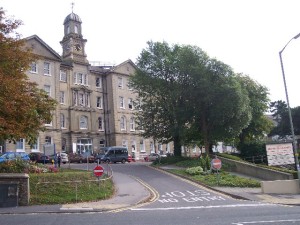Plans to build homes on the Brighton General Hospital site pose a threat to what is believed to be the biggest and oldest colony of endangered swifts in Brighton and Hove.
Housing is needed but it does not have be at the expense of birds like swifts which are such a wonderful element of our summers.
There are even policies in place aimed at protecting the biodiversity of an area when building takes place.
But the RSPB (Royal Society for the Protection of Birds) is keen to ensure more effective measures – and here’s why.
In just a few months’ time, swifts will be making their epic 6,000-mile journey here from Mozambique.
They’re only here for a short time – between May and August – and that’s when they can be seen soaring through the skies and swooping down, either catching insects or looking for potential breeding sites. They have a very distinctive call which many people associate with summer.
While most enjoy the return of the warmer weather and the sounds that come with it. What would it be like if the spring or summer progressively got quieter?
Their scientific name Apus apus means “no foot no foot” as swifts can’t perch or land on the ground. This also means that there is no bird mess below the sites where they nest.
Swifts are, however, superb flyers and spend almost their entire life on the wing apart from when breeding.
Unfortunately, as with many other bird species, swifts have experienced dramatic declines.
Surveys carried out by the British Trust for Ornithology (BTO) show a decline of more than 50 per cent over 20 years in the swift population in Britain.
Common swifts once nested in trees but are now almost entirely reliant on buildings to nest. Modern properties are now constructed in ways that exclude potential future opportunities for birds like swifts to nest.
There is also the risk that because they are so unobtrusive people don’t realise that they have a swift in their home and if maintenance works or loft conversions get carried out the holes can get blocked.
Swifts are “site faithful” and will come back year after year to the exact same nest awaiting the arrival of their life-long partner. Swifts are also colonial birds and like to nest where other swifts do.
But there are simply not enough new nesting opportunities in new developments across Brighton and Hove.
Without a clear policy that compensates for the loss of nests and provides new opportunities in new developments, there is no guarantee that swifts will thrive in Brighton and Hove in the future.
The RSPB has already made headway on understanding where swifts are nesting in Brighton and Hove – and the key local hotspots – by undertaking surveys of the city.
These have been carried out by volunteers over the past three years, with a total of 105 nest sites found since 2016. These nests exist thanks to some of the nooks and cranes that come with older properties.
Swifts nests are easily incorporated into the fabric of new developments, being relatively low in cost, and – with the various designs available – they offer easy-to-achieve enhancements for biodiversity gain.

Brighton and Hove City Council is drawing up a set of policies known as City Plan 2 and it provides the perfect opportunity to include a clear – and in this case – a “species specific” policy.
Brighton and Hove is a leading city for conservation and has national reputation for being environmentally friendly. Here is yet another way that we can lead the way and it is pleasing to report that councillors and council officials appear to be receptive.
And of course it is very timely with the prospect of hundreds of new homes being built on the Brighton General Hospital site.
The RSPB’s vision is that, by working with the council, swift bricks will be installed in every suitable new development in accordance with a strengthened policy, ensuring developers adhere to new legislation.
For most people, council policies are unseen but – in this case – a small change could help a much-loved bird continue to be seen for many more years to come.
Chloe Rose is a conservation officer for the Royal Society for the Protection of Birds in Brighton.











With the measure brought by councillors Andrew Wealls and Robert Nemeth, on behalf of residents, at yesterday’s Tourism and Culture Committee about swifts, there are now measures in place about swifts. Much hope this helps the swifts who are set to retunr to the Hospital.
So they will be making a swift return Christopher.